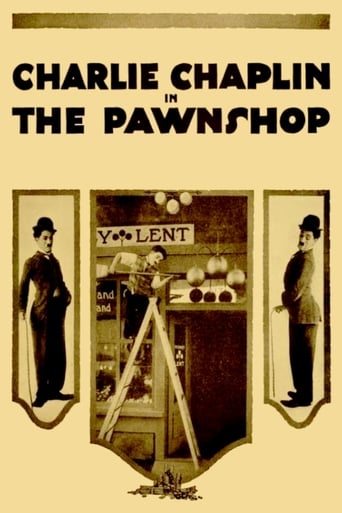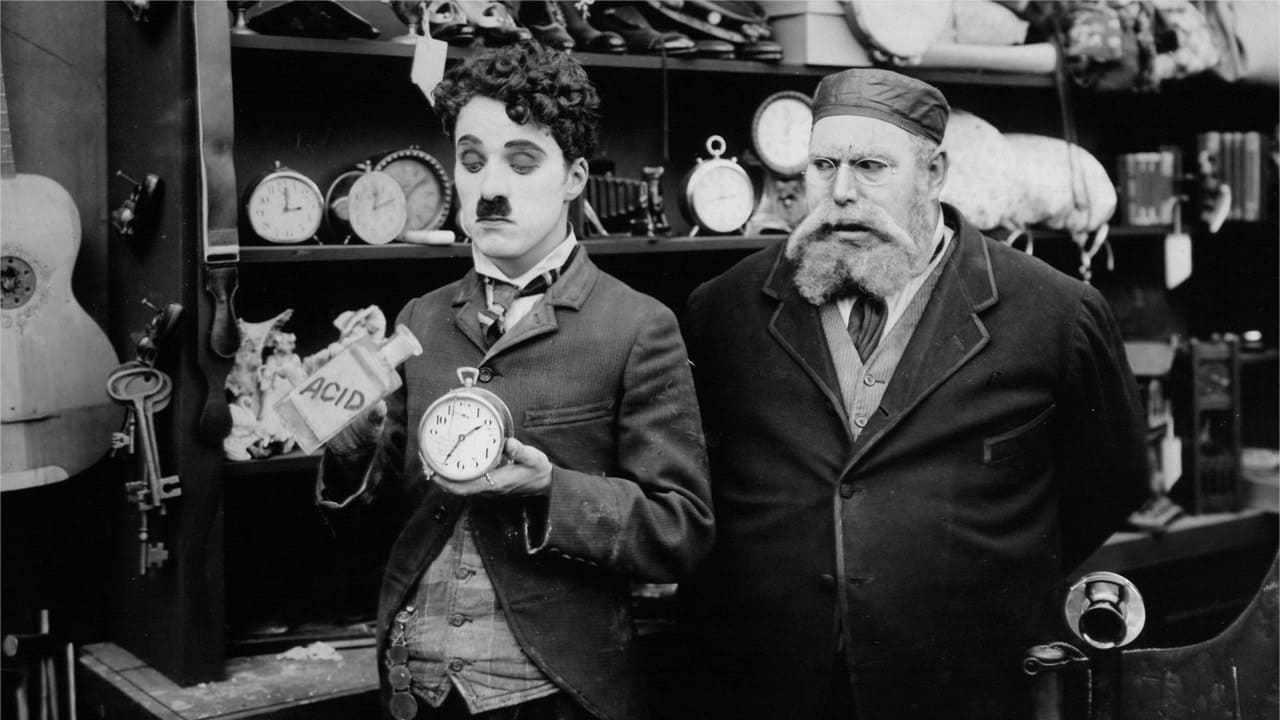TheLittleSongbird
Am a big fan of Charlie Chaplin, have been for over a decade now. Many films and shorts of his are very good to masterpiece, and like many others consider him a comedy genius and one of film's most important and influential directors. From his post-Essanay period after leaving Keystone, 'Pawnshop' is not one of his very best but is one of his best early efforts and among the better short films of his. It shows a noticeable step up in quality though from his Keystone period, where he was still evolving and in the infancy of his long career, from 1914, The Essanay and Mutual periods were something of Chaplin's adolescence period where his style had been found and starting to settle. Something that can be seen in the more than worthwhile 'The Pawnshop'. The story is more discernible than usual and is never dull, but is sometimes a bit too busy and manic and flimsy in others.On the other hand, 'The Pawnshop' looks pretty good, not incredible but it was obvious that Chaplin was taking more time with his work and not churning out countless shorts in the same year of very variable success like he did with Keystone. Appreciate the importance of his Keystone period and there is some good stuff he did there, but the more mature and careful quality seen here and later on is obvious.While not one of his most hilarious or touching, 'The Pawnshop' is still very funny with some clever, entertaining and well-timed slapstick, didn't mind that the pathos wasn't there as it was not the right kind of story. It moves quickly and there is no dullness in sight. The clock scene is one of the most uproariously funny and best scenes of any of Charlie early career output.Chaplin directs more than competently, if not quite cinematic genius standard yet. He also, as usual, gives an amusing and expressive performance and at clear ease with the physicality of the role. The supporting cast acquit themselves well, particularly the charming regular leading lady Edna Purviance.Overall, very enjoyable. 8/10 Bethany Cox
lugonian
Charlie Chaplin is at it again in another comedy short for which he wrote, directed as well as starred in THE PAWNSHOP (Mutual/Lone Star Studios, 1916). Following the pattern of working man comedies for the studio starting with THE FLOORWALKER (1916) and THE FIREMAN (1916) followed by occasional drifter characters as in THE VAGABOND (1916), for his sixth Mutual comedy, he's back in the working force again, this time in a pawn shop creating havoc under the watch of nameless characters as his employer (Henry Bergman), the employer's daughter (Edna Purviance) and fellow co-worker (John Ran, resembling silent comic Chester Conklin) with whom he shares a kicking contest from time to time in the seats of their pants.The plot is a slight one consisting of runabout gags in the usual Chaplin tradition. After arriving late for work, Charlie begins his new day of antics as using a duster on a fan that's still in motion, shifting the latter back and forth, unintentionally hitting those around him, particularly his co-worker (John Rand) and his employer (Henry Bergman), to dust off the ornamental fixtures outside the pawn shop as observed by a policeman (Frank J. Coleman). Nearly getting fired, Charlie is given a second chance, making an impression with the boss's daughter (Edna Purviance), later coping with oddball customers at the front counter, including an out of work actor (James T. Kelly) with a hard-luck story; another (Albert Austin) wanting two dollars as a trade in for his alarm clock; an elderly woman (Charlotte Mineau) wanting something for her gold fish bowl; and a jeweler (Eric Campbell) wanting to see some diamonds for purchase, unaware to all (except for the viewer reading the title card identifying him as "A Crook") that he's there to rob the place.An extremely funny comedy, with one of the highlights being that from Albert Austin, the man with the alarm clock. He really doesn't do anything but just stands there, watching Charlie playing doctor as he checks over the clock with a stethoscope, resulting to a hilarious scene close. Somehow, these few minutes between Chaplin and Austin is as good as it gets. Another moment of funny business has Charlie helping Edna in the kitchen by passing plates and cups to dry through a clothes wringer. Surprisingly, Eric Campbell, the giant-size adversary usually part of Charlie's antics, gets little screen time, making his first appearance very late into the story. In spite of his limitations, Campbell makes every moment of his count where laughs are concerned. Henry Bergman, (no relation to Ingrid or Ingmar), resembling some cast member from "The Jazz Singer" in his Hebrew garb, doing what he does best as part of Chaplin's stock company of players.A laugh fest at best that, along with Chaplin's other Mutuals, THE PAWN SHOP has circulated on public television in the sixties and seventies with musical soundtrack with sound effects lifted from early 1930s reissue prints, prints that have been available to home video in the 1980s and 90s by Blackhawk and/or Republic Home Video, or original scoring for commercial television for "Charlie Chaplin Comedy Theater" that originated in the 1960s. In later years, THE PAWN SHOP has become available on DVD, namely KINO Home Video with new orchestration and at longer length (28 minutes) through silent speed projection, the print occasionally shown on cable television's Turner Classic Movies (TCM premiere: December 13, 1999). So if anyone has anything to pawn, particularly a clock once belonging to Albert Austin, take it to Charlie's pawn shop, and then go seek professional help. Next Chaplin Mutual comedy: BEHIND THE SCREEN (1916). (***)
wadetaylor
This is definitely one of Chaplin's top 5 or 6 shorts. The part with Albert Austin and the clock is just so hilarious, and I really like the end of that bit where the drunk gets pushed down, just because it makes no sense. I think this is the exact point in Chaplin's oeuvre in which he matured to the point in which he could make masterpieces. Don't get me wrong I like many of his earlier shorts, but everything he did from this point on could be argued as a masterpiece of comic cinema.It is true that there isn't a great amount of pathos in this one, but I like the fact that there a just so many ridiculous situations that come one after the other. A+ grade.
hausrathman
Charlie plays an assistant at a pawnshop with a eye for the owner's daughter and a skill for making mischief. "The Pawnshop" is perhaps least plotted of Chaplin's Mutual films. Charlie thwarts Eric Campbell's plan to rob the business, but little screen time is devoted to that story. This is a situational, or should I say, occupational comedy, where Charlie and his talented cast and crew try to make the most of a particular setting. The best sequence in the film comes when customer Albert Austin arrives with a clock to pawn. Charlie hilariously and inventively destroys the clock in his attempt to discern its value. This "business" - the ability to wring comic potential from simple everyday items - is a lost skill among modern comics. Chaplin was a master at it, and this film serves as a good example why.


 AD
AD


